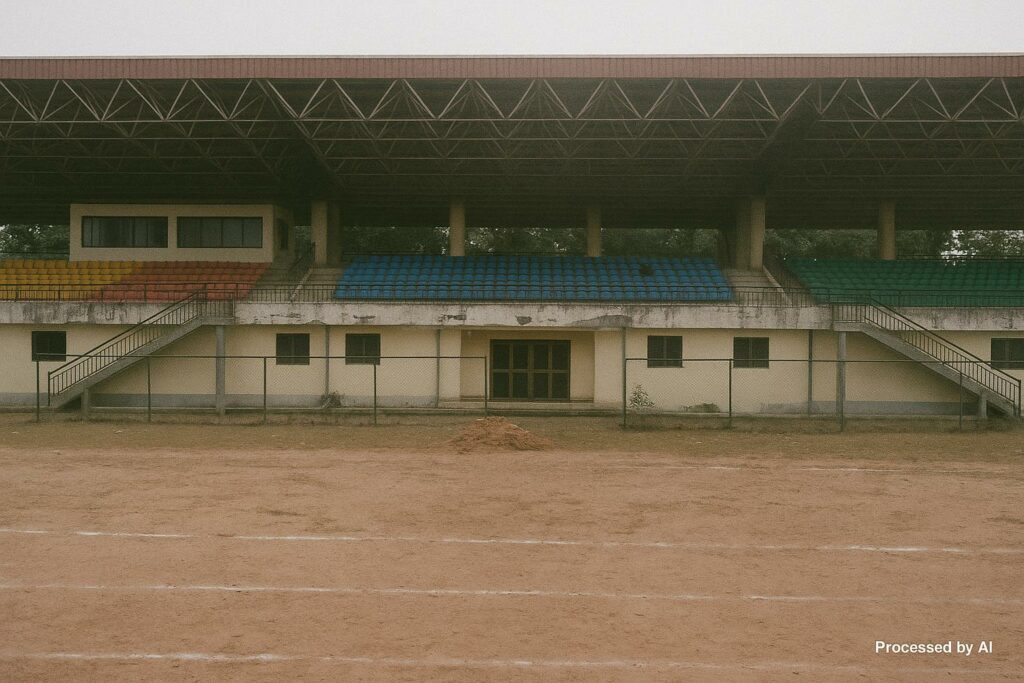A stadium reclaimed for civic harmony
The refurbished Omnisports Stadium of Kinkala, once an understated municipal venue, now stands polished and symbolically recalibrated. Local authorities completed an accelerated sanitation and renovation campaign in late July, responding to Mayor Edwige Ndebeka Biyengui’s call for a “population that remains obedient, cohesive and forward-looking.” The operation, executed largely by volunteer residents, did more than remove debris; it repositioned public space at the centre of a regional dialogue on coexistence. Whether grass was clipped or terraces repainted, every gesture served as a tacit reminder that physical infrastructure is inseparable from the social contract it shelters.
Sport as a vector of post-conflict healing
Almost a decade after the last major security flare-up in the Pool, reconciliation has progressed, yet trust still demands visible rituals. International organisations such as the African Union have repeatedly emphasised the utility of ‘soft power athletics’ in fragile contexts. By pitting the Pool’s regional selection against their peers from Djoué-Léfini, organisers revive the healthy rivalries that existed before political fractures. Municipal councillor Lié Bidié Banzouzi called the fixture “our clearest proof that dialogue can be practiced through ninety minutes of fair play.” His remark echoes findings from a 2023 UNDP assessment which observed that participatory sport reduces the perception of inter-group threat among Congolese youth. The upcoming kick-off is therefore less a contest for points than an exercise in collective memory, reminding spectators that the whistle of a referee has finally displaced the crack of small arms once heard in these hills.
Youth universities and entrepreneurial ambition
The match forms the public face of the second edition of the Pool Youth Universities, an initiative championed in parliament by Deputy Elbe Biscay Bidié. Inside conference tents adjacent to the stadium, panels will debate micro-finance instruments and cooperative farming models tailored to semi-urban districts; football is merely the galvanising headline. Authorities argue that income-generating activities, not subsidies, are the long-term guarantors of peace. In private conversation, a senior official from the Ministry of Youth and Civic Education described the programme as “an incubator of patriotic business plans.” While metrics remain provisional, early data from the inaugural edition show that twelve community enterprises wp-signup.phped with the departmental chamber of commerce, ranging from cassava processing to digital services.
Governmental alignment with local aspirations
Brazzaville’s national strategy, articulated in the 2022–2026 National Development Plan, assigns sports diplomacy an auxiliary yet explicit role in regional stability. By endorsing the Kinkala fixture, central authorities reinforce a narrative of inclusive governance without overtly militarising the peace dividend. Observers from the Congolese Football Federation confirm logistical support, while the Interior Ministry quietly facilitated security protocols, ensuring an event focused on celebration rather than surveillance. Crucially, the initiative remains framed by municipal leadership, preserving a bottom-up optic valued by international donors. Such calibrated cooperation preserves the sovereignty of local voices while showcasing the state’s capacity to federate resources.
A measured outlook for regional stability
Expectations are high, yet officials avoid triumphalism. The Pool’s complex history advises prudence, and stakeholders recognise that a single match cannot erase decades of mistrust. What it can deliver is a visual grammar of concord: opposing captains exchanging pennants, young vendors circulating iced water, local musicians providing halftime rhythms. Each scene will be amplified across social media, projecting an image of stability that investors and diplomats increasingly demand. If the ball traverses midfield with ease on 27 July 2025, it will signal that the ground beneath it—both literal and political—has been carefully levelled. In that sense, the scoreboard may matter less than the simple fact that the game could be played at all.

